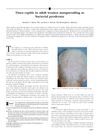 April 2017 in “European Psychiatry”
April 2017 in “European Psychiatry” Some antidepressants can cause emotional numbness and other unusual side effects.
 August 2001 in “Veterinary Dermatology”
August 2001 in “Veterinary Dermatology” The meeting presented findings on effective treatments for various pet skin conditions and insights into the immune responses of dogs with atopic dermatitis.
 32 citations,
August 2003 in “Journal of the American Academy of Dermatology”
32 citations,
August 2003 in “Journal of the American Academy of Dermatology” Tinea capitis can be misdiagnosed as bacterial infection in adult women but is treatable with antifungal medication.
[object Object]  26 citations,
June 2005 in “Journal of The American Academy of Dermatology”
26 citations,
June 2005 in “Journal of The American Academy of Dermatology” Some patients receiving pegylated interferon alfa injections developed skin necrosis, requiring treatment adjustments or discontinuation.
 April 2016 in “Journal of The American Academy of Dermatology”
April 2016 in “Journal of The American Academy of Dermatology” People with certain allergic conditions or higher white blood cell counts have more severe hair loss, and treating hair and nail side effects early in melanoma therapy can improve quality of life.
 2 citations,
January 2021 in “JAAD Case Reports”
2 citations,
January 2021 in “JAAD Case Reports” Using a special laser and skin medication together successfully cleared a skin condition in a pregnant woman.
 9 citations,
May 2012 in “British Journal of Dermatology”
9 citations,
May 2012 in “British Journal of Dermatology” Reversing female hair loss.
1 citations,
October 2023 in “Frontiers in Oncology” Genomic profiling for myeloid cancers can find important inherited mutations, but it's challenging when these mutations aren't related to the patient's symptoms.
 March 2024 in “Jurnal Ilmu Kesehatan Hewan”
March 2024 in “Jurnal Ilmu Kesehatan Hewan” The treatment was effective for the puppy's skin and intestinal infections.
April 2023 in “Journal of Investigative Dermatology” Interface dermatitis is the most common skin change in drug-induced hypersensitivity syndrome.
January 2023 in “Journal of Veterinary and Animal Sciences” Dogs with skin lesions often have blood abnormalities and damaged hair.

A man with a rare lung-focused form of hypereosinophilic syndrome improved with steroid treatment.
 November 2015 in “Clin-Alert”
November 2015 in “Clin-Alert” Some medications and supplements can cause serious side effects, including hair loss, heart rhythm problems, liver injury, and other health issues.
July 1974 in “Archives of dermatology” The woman's widespread skin condition did not improve despite various treatments.
 April 2016 in “Journal of The American Academy of Dermatology”
April 2016 in “Journal of The American Academy of Dermatology” The study found that severe alopecia areata affects any age, treatments often give temporary results, and some factors predict worse outcomes.
 April 2017 in “European Psychiatry”
April 2017 in “European Psychiatry” Women with schizophrenia on atypical antipsychotics are more likely to have polycystic ovarian syndrome (PCOS) than women without schizophrenia.
 April 2017 in “European Psychiatry”
April 2017 in “European Psychiatry” An older woman had false beliefs after taking a depression medication, which stopped when she stopped the medication.
 9 citations,
March 2011 in “Clinical and experimental dermatology”
9 citations,
March 2011 in “Clinical and experimental dermatology” The document concludes that anticonvulsants like phenytoin may cause skin reactions by affecting tryptophan metabolism and suggests researching vitamin levels in patients with drug reactions.
[object Object]  273 citations,
May 2017 in “The Lancet”
273 citations,
May 2017 in “The Lancet” Some drugs can cause rare but potentially deadly skin reactions, and early treatment and avoiding the drug again are key.
 33 citations,
February 1996 in “Lancet”
33 citations,
February 1996 in “Lancet” Losartan can cause temporary loss of taste.
 18 citations,
March 1984 in “BMJ”
18 citations,
March 1984 in “BMJ” Minoxidil helps hair regrowth in alopecia, but more research needed.
 9 citations,
July 2017 in “Journal of medical case reports”
9 citations,
July 2017 in “Journal of medical case reports” Ruxolitinib treatment may cause eyelash growth.
 9 citations,
January 1987 in “Journal of The American Academy of Dermatology”
9 citations,
January 1987 in “Journal of The American Academy of Dermatology” A man lost a lot of scalp hair quickly after stopping minoxidil, but it grew back with mild male pattern baldness.
 8 citations,
August 2009 in “Pediatric transplantation”
8 citations,
August 2009 in “Pediatric transplantation” A five-month-old boy with Omenn syndrome successfully recovered after a stem cell transplant with reduced intensity conditioning.
 2 citations,
August 2022 in “Federal Practitioner”
2 citations,
August 2022 in “Federal Practitioner” A severe medication reaction required long treatment and led to hair loss and thyroid issues.
 2 citations,
October 2018 in “Springer eBooks”
2 citations,
October 2018 in “Springer eBooks” Cancer treatments can cause skin-related side effects that may affect patient quality of life and require changes in treatment.
 1 citations,
October 2013 in “The Journal of Dermatology”
1 citations,
October 2013 in “The Journal of Dermatology” Hair loss in a drug reaction case involved both a common shedding phase and an immune attack on hair follicle stem cells.
 1 citations,
January 1997 in “Dermatology”
1 citations,
January 1997 in “Dermatology” A woman lost her hair from stress after a bee attack and her sister's death.
 114 citations,
January 2007 in “Drug Safety”
114 citations,
January 2007 in “Drug Safety” Some drugs can cause skin, nail, and hair problems, which are important for healthcare professionals to recognize and report.
 74 citations,
August 2006 in “Journal of clinical gastroenterology”
74 citations,
August 2006 in “Journal of clinical gastroenterology” Shen-Min, a hair growth supplement, likely caused acute hepatitis in a woman, improving after she stopped taking it.


























